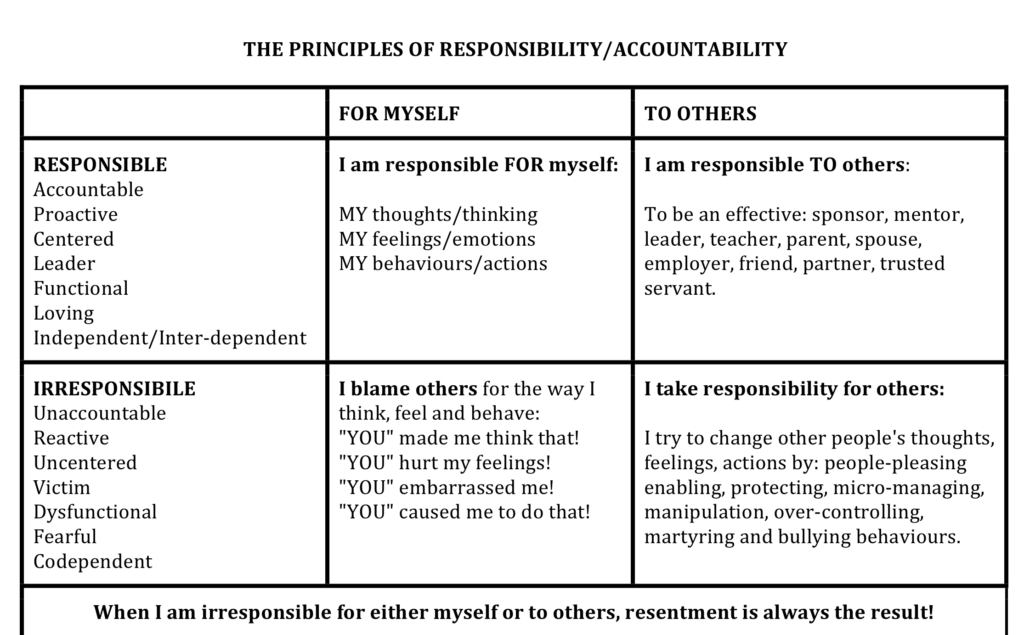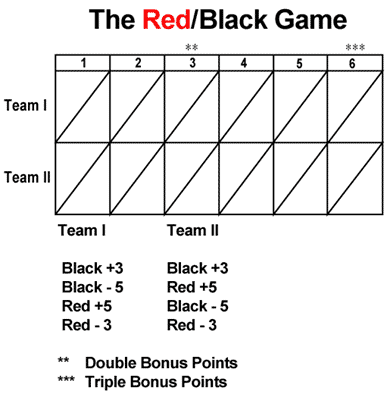
Responsibility
The concept that we are going to take a look at now, to my mind, is both the single most important concept for you to understand and also the most misunderstood concept in human relations. This is the concept of responsibility. Who are you responsible to and who are you responsible for.
Picture a square divided into four quadrants. The lower left quadrant is, “I am responsible for myself and no one else. I am responsible for my thinking, my feelings, and my behaviour.” The lower right quadrant is “I am responsible to others. I am responsible to love others. I am responsible to treat them well. If they are my children I am responsible to feed them, to clothe them, to provide a home for them”.
The upper left quadrant is, “I am irresponsible for myself. I am irresponsible for my thinking, I am irresponsible for my feelings and I am irresponsible for my behaviour.” This is the quadrant where I let others take responsibility for my thinking, my feelings, my behaviour. Look for blame e.g. “You made me do it!” “You hurt my feelings!”
The upper right quadrant is, “I am irresponsible to others.” I take responsibility for others, for the way they think, the way they feel, they way they behave. As a parent, I find this line easy to cross with my children. Look for blame e.g. “I feel embarrassed by my child’s poor behaviour, what will the neighbours think?” “He’s never on time for meetings and I’m getting so irrated at having to call him all the time to remind him to be on time?
So ask yourself, who are you responsible to and who are you responsible for. Have you been irresponsible for yourself and how have you been irresponsible to others?
Resentment is always the key! When you take responsibility for others, that is, you take responsibility for their thinking, their feelings, their behaviours and they don’t do as you expect, what feelings do you experience? When others take responsibility for your thoughts, your feelings, your behaviour, how does that make you feel? Resentment is always the key when we the line s crossed.
Let’s go deeper with this idea.
Exercise: In your journal, write:
- Who has been responsible for you, and how has that created resentment in your life?
- Who have you been responsible for and how has that created resentment in your life?
- What will your life be like in 5 years if you continue blaming others and letting others be responsible for your feelings?
- How important is it for you to become more responsible for yourself?
“Only when I am responsible FOR myself, can I be responsible TO others.”
THE RED BLACK GAME
(COMMENT: This is the last exercise at end of a very long day. The game of course, is rigged. It directly follows the long “responsibility process,” when participants are tired and in an emotional state. This game can be won only if the two sides cooperate. In the 10 years of organizing hundreds Lifestream seminars I have only witnessed a couple of “perfect” games.)
Facilitator’s Dialogue:
We are going to play a little game. It is called the red and black game. The object of this game is to get the most plus points possible. Let’s say that together. “The object of the game is to get the most plus points possible.”
Now in a moment we are going to divide up into two groups. One group is going to stay in this room, the other is going to go out into the hallway with the class leader. So we are going to play this game in two groups. Now if any one has played this game before, or a similar type of game, I want you to play the game with integrity but don’t give the game away to the other participants until after we have completed the game back here in this room.
Now the way the game works is like this. If Team 1 votes black and Team 2 votes black both teams get plus 3 points. If Team 1 votes black and Team 2 votes red, Team 1 gets minus 5 and Team 2 gets plus 5. If Team 1 votes red and Team 2 votes black, Team 1 gets plus 5 and Team 2 gets minus 5. If Team 1 votes red and Team 2 votes red, Team 1 gets minus 3 points and Team 2 gets minus 3 points. Now the object of the game as I have said is to get the most plus points possible. In the third frame each team gets double points. And in the sixth frame each team gets triple points for whatever they score.
Now when we break up into the two teams and Team 2 goes out into the hall you will have three minutes in which to vote for each frame. Everyone must vote in each frame and the majority vote wins. There is no passing on voting. Everyone must vote in each frame. Each team must elect a leader. The leader will count the votes, mark down what the vote is and tally the score. Both teams must vote in one frame at a time. You can not move on to the next frame until each team has voted and the vote has been communicated back and forth between the two teams. We will have a runner going back and forth communicating the vote. But when the runner comes into the room they must make sure that the team has voted before he gives them the other team’s vote. Are there any questions?

After the game has been played, Team 2 returns to the main room. The facilitator takes a very long hard look at each and every participant and replies, “THIS IS ONE OF THE SICKEST RED BLACK GAMES I HAVE EVER SEEN!”
Anyone who voted red five or more times please stand up. Anyone who voted red four or more times please stand up. Anyone who voted red three times please stand up. Anyone who voted red twice please stand up. Anybody who voted red once please stand up.
The leadership In this game was abominable. The only object in this game was to get the most plus points possible. And what did we get? The only vote acceptable is a black vote. Voting black is the only win/win solution. You vote black. You vote black. You vote black…6 times. Even if you voted black in every frame you stand up as well. You either knew the solution or you figured out the right thing to do. How many times in your life have you known the right thing to do and not stood up for it? How often have you held back and let others lead you down the path? How many people here had somebody in the other room that they cared about or even got to love in the last couple of days. And what did you do? You went right back to your old way of thinking , your winlose solutions, your winlose way of doing things and all you could think of doing was “Let’s get ’em. Lets nuke ’em. How do we beat them…you shit on them.”
Your assignment tonight is to write a paper on how you played the red black game and how this reflects your life. I don’t care if you have to stay up all night writing this paper. You will come in tomorrow morning fighting to be heard. To tell the class how you played the game, how it relates to how you have been living your life and what changes you are going to make to do things differently. There is to be no talking for one hour after leaving this room. It is imperative that you allow this experience to incubate for a minimum of one hour.
(Comment: The recrimination is very strong, and very effective. All participants, including staff reported being affected by it and remembering it. The pattern was the same for most classes where participants felt distraught because they tried to win by making the other side lose, or they figured out the key to winning, but they were too frightened to speak up or too self-critical to believe they knew the answer. Either way, one participant noted, everyone seemed to feel embarrassed and crushed. Another participant noted, it was, paradoxically, a no-win situation.
Article: Day 4 of the Lifestream Basic – Review and What’s going to be different about my life?